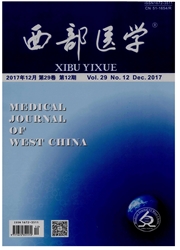

 中文摘要:
中文摘要:
目的:探讨根治性膀胱全切术后的最佳营养支持方法。方法:采用随机数法将60例根治性膀胱全切患者随机分为肠外营养支持(PNS)组和肠内营养支持组(ENS),比较两组患者的营养时间、术后下床时间以及住院时间、营养支持费用、血清总蛋白、白蛋白、前白蛋白以及术后并发症的发生情况。结果:术后7d,ENS组血清总蛋白、白蛋白及前白蛋白均显著高于PNS组(p〈0.05)。ENS组的营养时间、术后下床时间以及住院时间均短于PNS组(P〈0.05),且营养支持费用少于PNS组(P〈0.05)。两组患者术后均未发生肠梗阻等手术相关并发症,PNS组发生静脉炎3例。结论:早期肠内营养是根治性膀胱全切患者术后理想的营养支持模式。。
 英文摘要:
英文摘要:
Objective: To evaluate the clinical value of early enteral nutritional support for patients with bladder cancer underwent radical cystectomy. Methods: Sixty patients with bladder cancer underwent radical cystectomy were randomly divided into two groups, 30 cases in each group. Enteral nutritional support (ENS) and parenteral nutritional support (PNS) were used respectively, the levels of serum total protein, albumin and prealbumin, nutritional time, postoperative ambulation time, nutritional support costs, length of stay, and postoperative complications of two groups were compared. Results: The levels of serum total protein, albumin and prealbumin of ENS group were significantly higher than those of PNS group on the 7th day after surgery (p〈0.05). While the postoperative recovery time, length of stay and nutritional support costs were shorter than those of PNS group. There was no postoperative surgical complications in both groups, while the incidence rate of phlebitis in PNS group was 10.0 %(3/30). Conclusion: Early ENS was the ideal nutritional support model for radical cystectomy patients with bladder cancer.
 同期刊论文项目
同期刊论文项目
 同项目期刊论文
同项目期刊论文
 期刊信息
期刊信息
